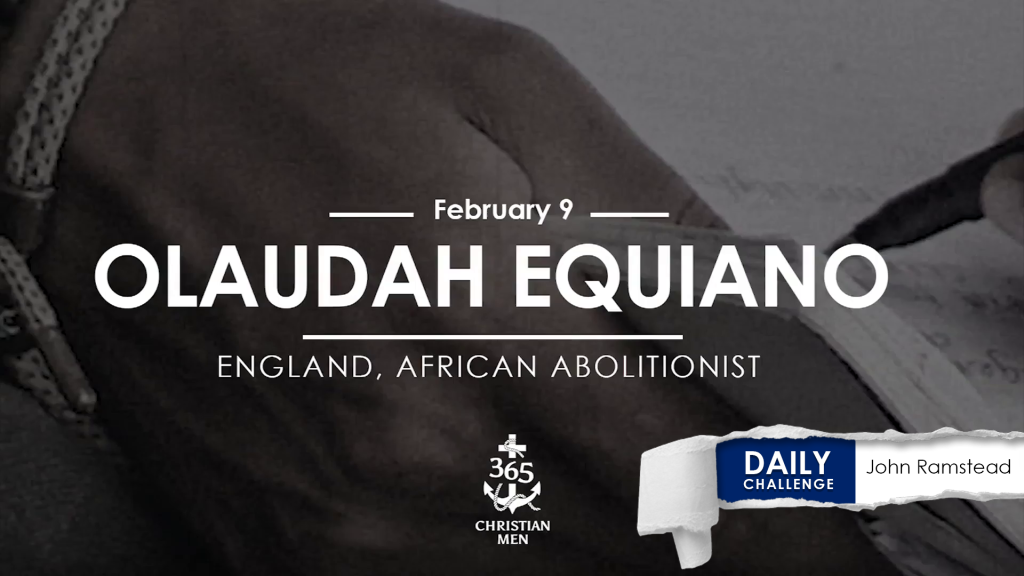February 9. Olaudah Equiano. As a child, Equiano was sold into slavery to a captain in the British Empire’s Royal Navy. Later, a Quaker trader bought him. Equiano became the man’s clerk, and he learned about Jesus. On this date in 1759, Equiano was converted to Christianity and was baptized.
Eventually, in 1766, by skillful trading and saving all he earned, he purchased his own freedom. In time he partnered with the same man who had once owned him.
He wrote and published his autobiography: The Interesting Narrative of the Life of Olaudah Equiano, or Gustavus Vassa, the African, and during his life, it went through one American and eight British editions. This gave him a platform from which to fight for the abolition of slave trading. Today’s story gives us a glimpse into the way Equiano thought.
When terror grips your soul, trust in the God who will not let you go.
In his memoirs, Equiano wrote that he considered himself “a particular favorite of heaven.” That revealed a lot about the character of the man. He was born in Africa and “had never heard of white men or Europeans, nor of the sea.”
But when Equiano was eleven, he was kidnapped and sold into slavery. Of the many jobs he learned, he became skilled on a ship. He bought his freedom more than once, and became a businessman in his own right.
At the end of one business trip in the West Indies, Equiano was ready to return to England. But Robert King, his business partner, begged Equiano to make another trade voyage to Atlanta, Georgia in the New World. He agreed and boarded the King’s ship, the Nancy.
Soon after the ship departed, Equiano had a dream. The same dream haunted him again the following night. And the next. “I dreamt the ship was wrecked amidst the rocks, and that I was the means of saving everyone on board.”
That third night, Equiano took the midnight watch on deck, and the helmsman immediately alerted him to a large fish swimming close to the bow. Equiano saw at once it was no fish. He was horrified. It was an enormous rock. Desperate to save the ship, he woke the slumbering captain and advised him to change direction, but by the time the captain arrived on deck, it was too late.
The vessel struck the rock.
Wave after wave slammed the ship against the rock and gashed the hull.
The terrified crew “abandoned all care of the ship, fell to drinking and lay about like pigs.” But Equiano thought about the Lord. He called to mind the many mercies the Lord had shown him in times past.
He sprang into action and devised an ingenious way to repair the boat: “We had no materials to mend our boat. I took some pump leather and nailed it over the hole and plastered it over with tallow-grease.”
His repairs held, and the next morning, Equiano and the four members of the crew who had remained sober spotted an island about six miles away—the perfect place to repair their ship. But the ship couldn’t cross the shallow reef that surrounded the island.
Equiano, an African who had suffered much at the hands of white men, could have chosen to abandon the white, drunken, unconscious sailors. But he could not help thinking that if any of those people had been lost, God would charge him with their lives.
So Equiano and his skeleton crew of four loaded the twenty-eight other survivors into a rowboat, a few at a time, and rowed them to the island. It took them six trips to deliver everyone to the island, lifting the boat over the reef each time, and by the end of their labor, their legs were cut and torn, and the skin was stripped entirely from their hands.
It was another eleven days before they managed to repair the boat, and Equiano became the leader of all the survivors.
Just like the Apostle Paul on his voyage to Rome, God spoke to Equiano and reassured him that not one person would be lost. And just like the Apostle Paul, Equiano refused to let fear paralyze him.
“The righteous person may have many troubles, but the LORD delivers him from them all” (Psalm 34:19 NIV).
Which fear do you need to conquer with God’s help today? When terror grips your soul, trust in the God who will not let you go.
Walvin, James. An African’s Life: The Life and Times of Olaudah Equiano, 1745–1797. London: A & C Black, 2000.
Equiano, Olaudah. The Interesting Narrative of the Life of Olaudah Equiano, Or Gustavus Vassa, The African. New York: W.W. Norton & Company, 1789.
Story read by Daniel Carpenter





